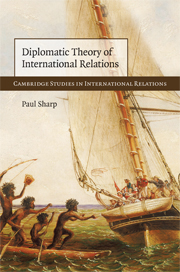Book contents
- Frontmatter
- Contents
- Acknowledgements
- Introduction
- Part I Traditions of international thought and the disappointments of diplomacy
- Part II Elements of a diplomatic tradition of international thought
- 4 The diplomatic tradition: Conditions and relations of separateness
- 5 The diplomatic tradition: Diplomacy; diplomats and international relations
- Part III Diplomatic understanding and international societies
- Part IV Thinking diplomatically about international issues
- Conclusion
- Bibliography
- Index
- Cambridge Studies in International Relations
5 - The diplomatic tradition: Diplomacy; diplomats and international relations
Published online by Cambridge University Press: 05 June 2012
- Frontmatter
- Contents
- Acknowledgements
- Introduction
- Part I Traditions of international thought and the disappointments of diplomacy
- Part II Elements of a diplomatic tradition of international thought
- 4 The diplomatic tradition: Conditions and relations of separateness
- 5 The diplomatic tradition: Diplomacy; diplomats and international relations
- Part III Diplomatic understanding and international societies
- Part IV Thinking diplomatically about international issues
- Conclusion
- Bibliography
- Index
- Cambridge Studies in International Relations
Summary
Relations of separateness do not have to be conducted by diplomacy and diplomats. War and soldiers, trade and merchants, slavery and slavers, extermination and criminals can also serve, sometimes concurrently with diplomacy, but more often driving it out. However, when peoples must have relations, but do not want, or believe that they cannot have, relations like those just listed, something recognizable as diplomacy quickly emerges. That is to say there is very little in the way of peaceful relations of separateness without diplomacy. Law and lawyers and politics and politicians, for example, may provide peaceful relations, but not relations of separateness. To explain why this is so and, indeed, what I mean by it, I will return to the anthropological fictions about the beginnings of diplomacy and employ my own version of them.
The emergence of diplomacy within the diplomatic tradition
Recall that most of these postulate a first encounter between peoples who were previously unaware of each other's existence. The waterhole meeting between ape-like humans in the film 2001: A Space Odyssey is emblematic in this regard, although unfortunate in that it leads to the discovery of how a jawbone may be used as a weapon. We may imagine things turning out more fortuitously. Since both parties need access to the waterhole, and neither seems capable of overwhelming the other, one imagines multiple violent encounters until one or both parties wish to stop fighting but stay in contact and both parties find a way of communicating with each other.
- Type
- Chapter
- Information
- Diplomatic Theory of International Relations , pp. 93 - 110Publisher: Cambridge University PressPrint publication year: 2009



